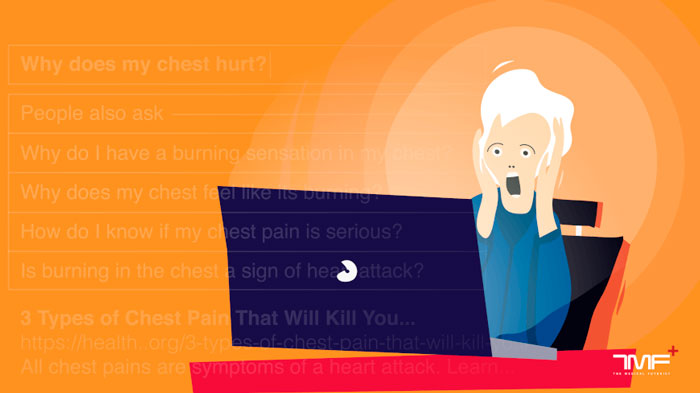Nowadays, when we feel unwell, the first source to offer us help is the omniscient Internet rather than a doctor. It is simple and affordable. However, you should not believe that the soulless search engine will make a proper diagnosis and bring you salvation. This is dangerous not only from the point of view of physical well-being but also from mental health.

People who are too excited about searching a diagnosis on the Internet run a risk of becoming cyberchondriacs. In this article, you will learn about this phenomenon, its signs and how to get rid of cyberchondria.
What cyberchondria is
Cyberchondria is a psychological and emotional disorder that is characterized by an obsessive search for information about symptoms (imaginary or real), followed by making a suspected diagnosis oneself.
The term came along with the expanding capabilities of the worldwide network in 2001. At that time, the British media published information that citizens began to spend too much time on medical websites. It was during this period that the number of cases, where people came to see a doctor with a coined diagnosis, increased. At that time, the phrase “splitting headache” was in the lead in the list of search queries.
In light of recent events, when the world is in a widespread panic because of the spread of coronavirus, a new wave of cyberchondria has covered humanity.
Why googling your symptoms is dangerous
The phrase “splitting headache” was in the lead in the list of search queries because it covered 25% of the total number for the period under study. And what do you think all these users received as an answer? It was “a brain tumor”. Even though that only 0.0002% of the world’s population suffers from such a terrible diagnosis.
Why did the answer “brain tumor” come up so often? Indeed, a splitting headache is more often caused, for example, by excessive drinking of coffee or exhaustion. Eric Horvitz, the holder of a medical degree, explains this phenomenon with the fact that at an unconscious level information, brightly colored by emotions, “hooks” people. What users should do with it depends only on their objectivity and mental health.

Cyberchondria is the result of a cognitive error of thinking caused by an unreasonably high attention to terrible diseases. The first positions in the search results are due to factors associated with the device of the search engine, and not with the frequency of occurrence in real life.
Signs of cyberchondria
At an unconscious level, our thinking often focuses on negativity, while positive news is ignored. This is due to the instinct of self-preservation and the need to always be on the alert. There is no escape from basic instincts because they provide security and help prolong life. However, if you notice the following behavioral issues for yourself or your closest people, the line between common sense and obsession has already been crossed.
Signs of being cyberchondric:
- Constant monitoring of information about your ailment;
- Excessive health concern for no objective reason;
- The tendency to make a diagnosis, based only on information that was found in unverified sources;
- The propensity to exaggerate;
- Lack of objectivity in judgment and self-criticism;
- Deterioration of health (mental and physical) after the next amount of received information.
How to deal with cyberchondria
The authority of “Doctor Google” is very difficult to undermine, especially if the signs of addiction are evident. But there are tips that will help a person become more objective.
Let yourself doubt
Doubt everything that you read and hear. Quite often, the information that causes strong emotions is not completely objective. It is better to look at your problem and attitude to it from different angles because tunnel thinking forms narrow-mindedness. When you are a narrow-minded person, it is impossible to see the full picture, but only one piece of it, and, as a rule, it greatly distorts reality.

Filter information
If restraining your desire to google your ailment is difficult, give yourself a little slack, but do it wisely. Distinguish a source that respects its reputation from a mediocre one. The signs of a good level website are:
- high-quality content with references to the author, who is competent in this matter
- well-written, clear and reasonable information
- feedback
- links to evidence-based medical sources and researches
- lack of manipulative content
- lack of emotionally charged content that imposes a certain point of view on the reader.
Admit your fears
Most cyberchondriacs are terribly afraid of doctors and hospital treatment, even if it does not threaten them. In fact, seeking a solution to the problem on the Internet is a search for hope that the situation is under control and the disease can be dealt with on your own. However, real fear continues to exist in a suppressed form at an unconscious level. It is this suppression that causes psychosis. A cyberchondriac understands that he/she acts irrationally, but the fear of taking responsibility for his own health is stronger than this understanding.
Control your thoughts
The human brain is a little-studied mechanism, and the generation of thoughts is often the product of our unconscious attitude to this process. Restless thinking leads a person into negativity and gains full control over his/her condition. It blocks the ability to think straight, to see not only threats but also possibilities. Unfortunately, the endless stream of diverse information makes you think about everything at once. Therefore, separate the wheat from the chaff, otherwise, an excess of negativity will drag you into psychosis.
Take your gadgets offline
It means a proper rest from the Internet. This kind of reboot is recommended for everyone.
The most effective ways: doing what you love, physical activity, unity with nature, contact with close and nice people, attending an interesting event or vacation. In a word, you should replace negativity with positive things. This will help you get rid of gloomy thoughts and accept reality, where everything is fine.
Do not self-diagnose and self-medicate

It is dangerous and not known, where this may lead you in the future. The results of interference with your own body may be irreversible, and time may be lost. No matter how nasty the thought of visiting a doctor is, sometimes this is the most reasonable thing you can do.
Ask for help
If visiting a doctor is fraught with much anxiety, you should immediately visit a psychotherapist or talk with a person you trust. Thus, you learn to deal with anxiety, and, above all, to understand the causes of your fears and prepare for the next steps.
Do not rely entirely on the robot, which is a search engine. Learn to analyze information and do not make hasty decisions. And most importantly, do not panic!










